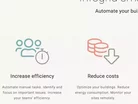Tech predictions from AI smart building platform Infogrid

Infogrid is an AI-powered smart building platform that collects data on the workplace environment and can help reduce virus risk as well as CO2 emissions.
The pandemic has had an era-defining impact. While 2021 produced few new technological or business developments, it certainly accelerated many technology trends already in motion.
In this article, CEO William Cowell de Gruchy looks ahead to key trends for 2022, including a smart building revolution and machine learning enhancing employee productivity.
2022 will be the year of a smart building revolution
In today’s world, businesses are more environmentally aware than ever before, with many pledging to limit their carbon emissions to net-zero by 2050. To reach this target, organisations will be doing what they can to reduce their carbon footprint, and a great place to start is right in their own workplace. Space and hot water heating account for 21% of the energy used in the UK. Further to this, 19% of the UK’s Greenhouse Gases come from heating the places we live and work in, and 10% of the UK’s electricity consumption comes from air conditioning units. Businesses can make a big reduction in their CO2 emissions in 2022 by developing a better understanding of how they use HVAC systems with smart building technology.
These systems currently operate in a data vacuum, businesses often have little information beyond what they set on the thermostat. The latest Machine Learning (ML) algorithms can optimise for efficiency and reduce carbon emissions by collecting data on systems and office environments, allowing businesses to extract insights from this. While moving to a new, more efficient building might seem like a good idea, building construction is incredibly energy-intensive and produces high levels of carbon emissions. Smart building technology has an immediate impact and can keep existing buildings viable for much longer.
In the next 12 months and years to come, we hope to see businesses make smart and sustainable choices to ensure they are making an impact on net-zero targets and have their own ‘house in order’.
The workplace environment has been a data blind spot, and 2022 will see that change as more organisations look to improve their building’s efficiency. Smart building tech such as ML algorithms provide this and lets companies fix problem areas, saving money and CO2 emissions.
Machine learning will enhance employee productivity
The COVID-19 pandemic has accelerated the need for a healthy working environment. Whether businesses are returning to the office full-time or implementing hybrid working models, a healthy workplace is an increasingly important factor in maintaining employee morale and even in the recruitment and hiring process.
Another growing concern is how the workplace environment affects productivity. Many office workers will have stories of their eyes drying out due to low humidity, or a colleague wearing gloves in the office because it’s been too cold to type, leading to low productivity levels and increased errors.
Businesses are currently lacking data on the workplace environment. In 2022, we expect to see more companies adopt new smart building technologies such as machine learning platforms to collect data where there previously has not been any, and provide analysis that businesses can use to create a more productive working environment, resulting in increased employee well-being.



